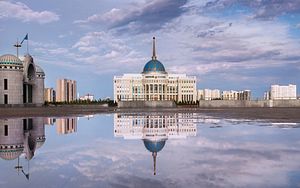Weekend Central Asia reads (and things to watch for):
Astana Lets the Heads Roll: For two weeks protests, popped up around Kazakhstan in response to the impending implementation of changes to the land code that would have seen the auctioning of public land as of July 1. This week Kazakh President Nursultan Nazarbayev made a sudden reversal: after first blaming the protests on “provocateurs” and then evoking the specter of Ukraine-like turmoil if Kazakhstan didn’t hew to the principle of “unity,” he declared a moratorium on the land code changes, pushing them into 2017. Two ministers–economy and agriculture–were sacked and Nazarbayev is setting up a new Ministry of Information, which some are cheekily calling the “Ministry of Truth.” Astana even mass-texted Kazakhs the announcement of the moratorium, to make sure they heard.
There’s a lot to unpack from the protests and also Nazarbayev’s reversal. Bne Intellinews notes that “Nazarbayev in his usual ‘good tsar, bad boyars’ management style blamed the land crisis on individual members of government.” The article also points out that while the protests congealed around the land issue, they’re rooted in deeper discontent linked to the country’s economic troubles. Ahead of the reversal, Eurasianet carried a nicely detailed discussion of the roots of Kazakh frustrations.
Another interesting angle is the use of text messaging to get the word out about the change in policy. Merhat Sharipzhan, writing for RFE/RL, commented that the mass-text “appears to be a tacit acknowledgement that even here [in Kazakhstan], social and other digital media are gaining ground on Nazarbaev’s more traditional levers of information and power: state-dominated newspapers, television, and radio.”
With the changes pushed to sometime in 2017, it remains to be seen whether Astana is simply waiting for this flash of public passion to pass before moving ahead or if the government intends to bridge the ever-widening gap between state policymaking and civil society.
Tajikistan Under Review, Seeks Distraction: Friday, the UN Human Rights Council conducted its periodic review of Tajikistan’s human rights record. As frequent readers of Crossroads Asia will be aware, Dushanbe’s slate is far from clean. Several major countries offered strong criticisms, including Norway, the U.K., the U.S., and Canada, pointing to the banning of the IRPT, arrests of opposition members and lawyers, as well as other issues like torture and domestic violence (as of writing the session is ongoing in Geneva; I’ll have a more detailed review next week).
Coincidentally, a Dushanbe court picked Friday to say that back in December it had tried, convicted, and sentenced a man and a woman for plotting to assassinate President Emomali Rahmon on behalf of ISIS. The brief story, by Reuters, also features language calling the events of last September an “attempted coup.” Such an assessment uncritically parrots the Tajik government’s position.
No Parades, Please: On May 9, Russia and most of the former Soviet Union mark Victory Day in commemoration of the end of World War II. Last year, the 70th anniversary, featured massive parades across the region. But this year Kazakhstan and Kyrgyzstan–which both held parades last year–are eschewing such pompous displays. Kyrgyzstan will hold a “requirem rally” and Kazakhstan is simply not having a parade at all. According to Pravda, a Kyrgyz government spokesperson said military parades were reserved for anniversaries (round numbers, I figure), and that the country will be having a parade to celebrate its 25th independence anniversary on August 31.
Fun in the Post-Soviet Sun: Make sure to check out David Trilling’s photo essay capturing beach-going across the former Soviet Union: “The 15 countries born out of the fallen Soviet empire are not places often associated with beach vacations or bikinis. But from Bishkek to Vladivostok, the warming sun offers a universal escape.”

































